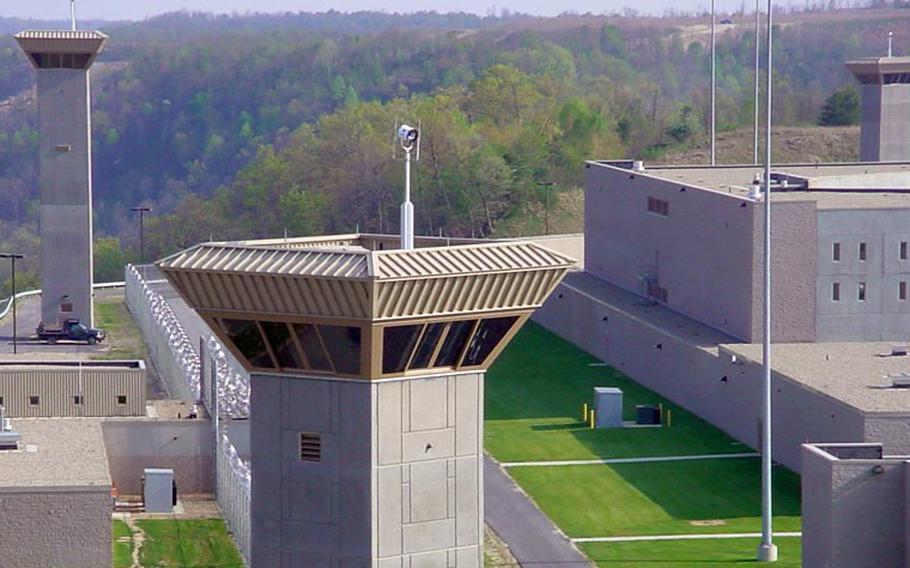
An undated photo of United States Penitentiary, Big Sandy, a medium-security prison in Inez, Ky. (Bureau of Prisons)
Across the country, behind the uniforms, medals and sacrifice lies a lesser-discussed crisis: the growing number of incarcerated veterans and the system’s failure to properly navigate their needs and rights once they’re behind bars.
According to the latest data, approximately 8% of the 2.2 million people incarcerated in U.S. jails and prisons are veterans, that’s about 176,000 individuals, most of whom served in combat. But these aren’t just statistics. Each number represents a person who once wore our nation’s uniform, many carrying the physical and psychological scars of service that were never fully treated or understood.
When a veteran goes to prison, they don’t just lose their freedom. They risk losing access to essential benefits that help them survive. Department of Veterans Affairs disability compensation is reduced after 60 days of incarceration, and VA pensions are terminated outright, regardless of whether the offense was a felony or misdemeanor. Educational benefits may be stripped down, and VA health care is severely limited inside correctional institutions.
This is more than just bureaucratic policy, it’s a lifeline lost. Many incarcerated veterans suffer from post-traumatic stress disorder, traumatic brain injury, depression, and substance abuse, often stemming from their time in service. In fact, research shows that 43.9% of veterans with TBI who lost consciousness met the criteria for PTSD, placing them at higher risk for behavioral outbursts and legal troubles.
It’s a painful irony: the very conditions veterans develop because of their service like PTSD, traumatic brain injuries, or substance use disorders are often the same reasons used to strip away the benefits they’ve earned. This disconnect is especially troubling in communities that offer promising alternatives, such as Veterans Treatment Courts, yet too many veterans either lack access or don’t even know these options exist.
Many incarcerated veterans also face the challenge of having less-than-honorable discharges, which can disqualify them from receiving VA benefits. But what many do not realize is that “Other Than Honorable” discharges do not necessarily bar veterans from receiving benefits. VA is required to make a Character of Service determination, and mitigating circumstances like mental illness, trauma or substance use linked to military service can weigh in a veteran’s favor.
However, the burden is often on the veteran or their advocates to gather documentation, submit evidence, and fight for eligibility. It’s a process made harder by incarceration, where access to records, legal support and the internet is limited at best.
I’ve worked with countless veterans who’ve hit these walls. I’ve seen how a dishonorable discharge due to behavior tied to untreated PTSD can leave a veteran without care, even though compelling circumstances like sexual trauma, brain injury or combat exposure are recognized by VA as valid mitigating factors.
We must do better for those who’ve borne the battle. Here are concrete steps we can take as a nation:
Expand access to Veterans Treatment Courts: These courts have been shown to reduce recidivism and provide the treatment veterans need, not just punishment. Yet availability and eligibility vary widely across the country.
Educate incarcerated veterans on their rights: Many do not know they can file a Character of Service determination or that some benefits can continue under certain conditions. Outreach must improve inside prisons.
Streamline VA coordination with correctional facilities: From reentry planning to record-sharing, the VA must take a more proactive role in supporting veterans’ transitions back to civilian life.
Support legislation to safeguard benefits: Policymakers must recognize that losing a pension or health care benefit doesn’t just hurt the veteran — it hurts their families and communities, too.
As a former Veterans Law Judge and someone who’s worked inside the VA system, I’ve seen the bureaucracy. But I’ve also seen hope in advocates who fight for these men and women, in judges who create second chances, and in communities that value service not just in words, but in action.
If we truly honor service, we must support veterans when the uniform comes off and when life gets hardest. Incarceration should not be a dead end, especially not for those who once stood to defend us.
Bradley Hennings is a partner at Chisholm Chisholm & Kilpatrick LTD and former Veterans Law Judge at the Board of Veterans’ Appeals. He currently serves as vice chair of the State Bar of Texas Military and Veterans Law Section.